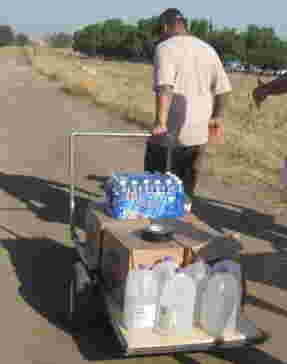Not only must
you have water, but it must be safe. There are countless water-born
diseases you keep for the rest of your life, and many of them will
make sure that that will not be very long. Boiling is good.
By definition, insurance is a gamble,
and billion-dollar insurance industries are based upon collecting far
more money than statistics would cause then to lose. The principle
here is that a 1000 dollars of insurance may be worth only 500
dollars of damage. On the other hand Ben Franklin observed that “An
ounce of prevention is worth a pound of cure.” If you have any
reason to question the stability of your current infrastructure, you
can by the time you need to implement an alternative plan for
acquiring water by investing a small amount in a few gallons of
stored water,
At the most primitive
levels hauling and, storing (see
30-gallon
tank), are your only options. Since this would not include
motorized transportation, the quantities involved would be small.
Needless to say, this all makes gardening more of a challenge, but
nobody said this was going to be easy.
This translates into an
important priority at the outset of your adventure: Make sure you can
guarantee yourself a supply of water.
Once the initial needs are
addressed, you can plan further:
Search the area for
abandoned wells or surface water, and move if necessary.
A shallow well might be drilled
through creative use of available tools and hardware (see Wells).
There are various ways you can
pump water from shallow wells and cisterns (see Pumps)
Large clean trash bags can make it
possible to store water in an otherwise unsuitable trash can.
People have survived by using
simple solar stills (see Solar Stills).
Think of something I haven’t
suggested
I have seen places
in a couple of countries where potable water was hauled in a truck,
and each home had a plastic container of about 300 gallons where the
purchased water was stored. There are good points to this system in
that people are far more aware of how much water they use, and within
limits, they can budget the usage to their incomes. In the event of a
natural disaster, most would have a little water stored that they
could live on for awhile. On a low budget, it might be more practical
for a developing village to piece-meal the storage of water in among
the household-sized tanks than to accumulate funds for a
community-scale reservoir.
On the other hand, this
makes the village quite precarious: Whoever controls the water can
potentially control the village. If the truck failed, or
the supplier wanted to triple the price of water, if gasoline became
unavailable, or if somebody wanted to shut down the town, there would
be a serious problem.

